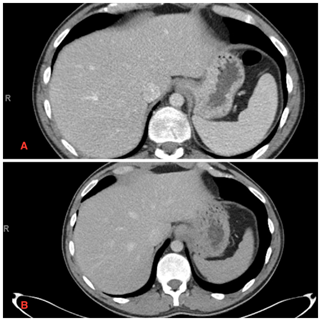Tuesday Poster Session
Category: Small Intestine
P6277 - Severe Duodenitis as the Initial Presentation of Adult-Onset Henoch-Schönlein Purpura
Tuesday, October 28, 2025
10:30 AM - 4:00 PM PDT
Location: Exhibit Hall
.jpg)
Amil Shah, DO
Parkview Medical Center
Pueblo, CO
Presenting Author(s)
Amil Shah, DO, Ahmad Zain, MBBS, Mustafa Nayeem, MD, Jessica Nash, DO, Lirio Polintan, MD
Parkview Medical Center, Pueblo, CO
Introduction: Henoch-Schönlein purpura (HSP) is a rare autoimmune disorder primarily associated with IgA antibodies, most commonly diagnosed in the pediatric population, and rarely presenting in adults. The classic clinical manifestations of HSP include a petechial or purpuric rash, typically without coagulopathy or thrombocytopenia. Arthralgias and gastrointestinal complications such as intussusception are also frequently observed.
Case Description/
Methods: We present case of a 36-year-old male who presented with intractable nausea, vomiting, and abdominal pain. He reported two episodes of coffee-ground emesis without melena, which had resolved by the time of admission. On presentation, he was hemodynamically stable with mild leukocytosis. CT abdomen and pelvis revealed duodenal mural thickening with adjacent inflammatory stranding, suggestive of severe duodenitis. EGD showed Los Angeles Grade B esophagitis, gastritis, and erythematous duodenopathy. Duodenal biopsies revealed mild acute inflammation. He was discharged on pantoprazole 40 mg twice daily.
Two weeks later, he returned with a purpuric, petechial rash on his lower extremities along with transient arthralgia. Labs showed mild leukocytosis, elevated liver enzymes, and mild proteinuria. Repeat CT showed decreased thickening in the third portion of the duodenum, but persistent changes in the fourth portion and proximal jejunum. Autoimmune workup, including ANA, ANCA, and complement levels, were normal. Skin biopsy revealed parakeratosis, hypergranulosis, and mild perivascular inflammation with rare eosinophils, raising concern for vasculitis.
Rheumatology evaluation suggested HSP. A kidney biopsy confirmed IgA nephropathy consistent with HSP nephritis. The patient was started on immunosuppressive therapy in coordination with rheumatology and nephrology, leading to improvement in gastrointestinal symptoms, systemic inflammation, and renal function.
Discussion: HSP is a self-limiting condition most commonly seen in children, with systemic complications like arthralgia and gastrointestinal issues, particularly intussusception. Less frequently, it may cause appendicitis, bowel ischemia, or perforation.
Extensive gastrointestinal inflammation, particularly marked duodenitis, as the initial presentation is rare and not well-documented. This case underscores the importance of considering HSP in adults with new gastrointestinal symptoms and significant inflammatory changes on imaging, as early recognition can prevent complications and improve outcomes.

Figure: A = Initial CT scan showing extensive duodenal inflammation and fat stranding
B = Interval CT scan showing improvement of duodenal inflammation and mural thickening
Disclosures:
Amil Shah indicated no relevant financial relationships.
Ahmad Zain indicated no relevant financial relationships.
Mustafa Nayeem indicated no relevant financial relationships.
Jessica Nash indicated no relevant financial relationships.
Lirio Polintan indicated no relevant financial relationships.
Amil Shah, DO, Ahmad Zain, MBBS, Mustafa Nayeem, MD, Jessica Nash, DO, Lirio Polintan, MD. P6277 - Severe Duodenitis as the Initial Presentation of Adult-Onset Henoch-Schönlein Purpura, ACG 2025 Annual Scientific Meeting Abstracts. Phoenix, AZ: American College of Gastroenterology.
Parkview Medical Center, Pueblo, CO
Introduction: Henoch-Schönlein purpura (HSP) is a rare autoimmune disorder primarily associated with IgA antibodies, most commonly diagnosed in the pediatric population, and rarely presenting in adults. The classic clinical manifestations of HSP include a petechial or purpuric rash, typically without coagulopathy or thrombocytopenia. Arthralgias and gastrointestinal complications such as intussusception are also frequently observed.
Case Description/
Methods: We present case of a 36-year-old male who presented with intractable nausea, vomiting, and abdominal pain. He reported two episodes of coffee-ground emesis without melena, which had resolved by the time of admission. On presentation, he was hemodynamically stable with mild leukocytosis. CT abdomen and pelvis revealed duodenal mural thickening with adjacent inflammatory stranding, suggestive of severe duodenitis. EGD showed Los Angeles Grade B esophagitis, gastritis, and erythematous duodenopathy. Duodenal biopsies revealed mild acute inflammation. He was discharged on pantoprazole 40 mg twice daily.
Two weeks later, he returned with a purpuric, petechial rash on his lower extremities along with transient arthralgia. Labs showed mild leukocytosis, elevated liver enzymes, and mild proteinuria. Repeat CT showed decreased thickening in the third portion of the duodenum, but persistent changes in the fourth portion and proximal jejunum. Autoimmune workup, including ANA, ANCA, and complement levels, were normal. Skin biopsy revealed parakeratosis, hypergranulosis, and mild perivascular inflammation with rare eosinophils, raising concern for vasculitis.
Rheumatology evaluation suggested HSP. A kidney biopsy confirmed IgA nephropathy consistent with HSP nephritis. The patient was started on immunosuppressive therapy in coordination with rheumatology and nephrology, leading to improvement in gastrointestinal symptoms, systemic inflammation, and renal function.
Discussion: HSP is a self-limiting condition most commonly seen in children, with systemic complications like arthralgia and gastrointestinal issues, particularly intussusception. Less frequently, it may cause appendicitis, bowel ischemia, or perforation.
Extensive gastrointestinal inflammation, particularly marked duodenitis, as the initial presentation is rare and not well-documented. This case underscores the importance of considering HSP in adults with new gastrointestinal symptoms and significant inflammatory changes on imaging, as early recognition can prevent complications and improve outcomes.

Figure: A = Initial CT scan showing extensive duodenal inflammation and fat stranding
B = Interval CT scan showing improvement of duodenal inflammation and mural thickening
Disclosures:
Amil Shah indicated no relevant financial relationships.
Ahmad Zain indicated no relevant financial relationships.
Mustafa Nayeem indicated no relevant financial relationships.
Jessica Nash indicated no relevant financial relationships.
Lirio Polintan indicated no relevant financial relationships.
Amil Shah, DO, Ahmad Zain, MBBS, Mustafa Nayeem, MD, Jessica Nash, DO, Lirio Polintan, MD. P6277 - Severe Duodenitis as the Initial Presentation of Adult-Onset Henoch-Schönlein Purpura, ACG 2025 Annual Scientific Meeting Abstracts. Phoenix, AZ: American College of Gastroenterology.
